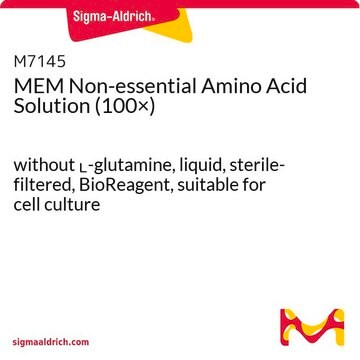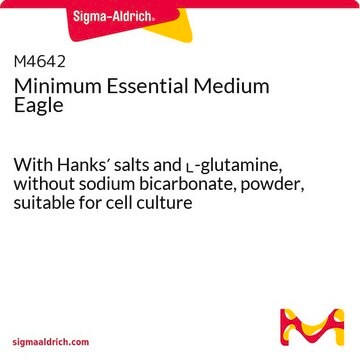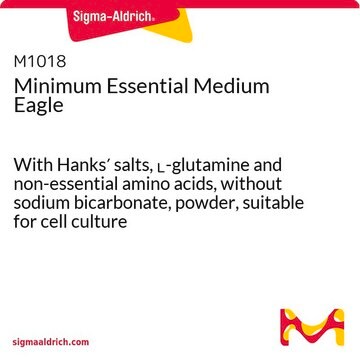M2414
Minimum Essential Medium Eagle
With Earle′s salts and reduced NaHCO₃. without ʟ-glutamine, liquid, sterile-filtered, suitable for cell culture
Synonym(s):
EMEM, MEM
About This Item
Recommended Products
Product Name
Minimum Essential Medium Eagle, Modified, with Earle′s salts and reduced NaHCO3. without L-glutamine, liquid, sterile-filtered, suitable for cell culture
Quality Level
sterility
sterile-filtered
form
liquid
technique(s)
cell culture | mammalian: suitable
impurities
endotoxin, tested
components
phenol red: 0.011 g/L
NaHCO3: 0.85 g/L
glucose: 1.0 g/L
L-glutamine: no
shipped in
ambient
storage temp.
2-8°C
Looking for similar products? Visit Product Comparison Guide
General description
MEM, which incorporates these modifications, includes higher concentrations of amino acids so the medium more closely approximates the protein composition of cultured mammalian cells. MEM has been used for cultivation of a wide variety of cells grown in monolayers. Optional supplementation of non-essential amino acids to the formulations that incorporate either Hanks′ or Earle′s salts has broadened the usefulness of this medium.
Application
Other Notes
Reconstitution
also commonly purchased with this product
Storage Class Code
12 - Non Combustible Liquids
WGK
WGK 1
Flash Point(F)
Not applicable
Flash Point(C)
Not applicable
Choose from one of the most recent versions:
Already Own This Product?
Find documentation for the products that you have recently purchased in the Document Library.
Customers Also Viewed
Articles
A large selection of MEM formulations. Minimum Essential Medium (MEM), developed by Harry Eagle, is one of the most widely used of all synthetic cell culture media.
Our team of scientists has experience in all areas of research including Life Science, Material Science, Chemical Synthesis, Chromatography, Analytical and many others.
Contact Technical Service





